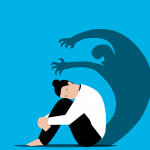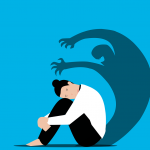Your business enhancing ‘thrival’ guide

There is no denying the past 12 months have been unprecedented bringing uncertainty to the security of many sectors, businesses and jobs. Change has become the new normal. Working from home disrupted people’s lives and personal health suffered. Mental health issues have skyrocketed.
A study1 conducted by UNSW in conjunction with the Black Dog Institute reported three quarters of the 5070 participants, that their mental health was worse as a result of the impact of covid. Wellbeing has become front and centre for businesses and business leaders need to support and care for their employees.
The good news is, it is actually a lot easier than you think to look after yourself and your team. This article explores simple strategies you can easily integrate into your busy day, to feel and perform better, so that businesses can thrive.
MINDSET
With so much uncertainty, people are worried about the future which can be a very disempowering feeling. A simple shift in focus can reduce worry and regain mental clarity and a more positive mindset.
Dial down worry
Human beings have a tendency to default to worrying thoughts. With conscious choice we can shift our focus from anxious thoughts to ones that are more positive and productive.
Upgrade gratitude
Instead of worrying about what’s not working and what’s going wrong, focus on the things that are working well, both within your personal life and within your business. This simple shift can make a huge difference to state of mind. Gratitude is a proven strategy for reducing stress and building a more positive perspective.
You can do this personally at the beginning – as you get up and start to get ready for the day and at the end of your day, before you go to sleep.
Professionally, as a business leader look to kick off meetings by first recognising what is going well and what is improving.
A little levity and laughter
Laughter is wonderful therapy for reducing stress. In fact, there is growing medical research to prove the health enhancing effects of laughter including improved immunity, soothing tension, reducing stress and improving mood.
At the office you could integrate lighter moments into meetings by opening up the floor for people to share a joke or a funny story that happened this week.
After a stressful day, dig out your favorite comedy shows and have a laugh Seinfeld could literally save the day.
Random acts of kindness
One positive consequence of Covid is that many people have forged stronger connections with family, friends and colleagues, even through isolation and working from home. But not everyone is doing well. Pay attention to the behaviours of others. If someone is acting out of character it might be that something is troubling them. Reach out and ask them how they are doing. Have light conversations that open windows for people to share. Or simply perform a ‘random act of kindness’ by doing something unexpected for others. Business leaders could recognise someone who is excelling or who did something positive to support other team members. Look to recognise others and surprise your team with ways to acknowledge them.
IMMUNITY
Stress suppresses our immunity so was must prioritise our own physical wellbeing even more by eating well, exercising and getting to bed on time. Here are some simple ways to improve our diet for better immunity.
Increase fibre
Gut health and immunity are closely linked and one of the simplest ways to improve gut health is eat a diverse, colourful diet of fruits and vegetables and increase fibre. Eat foods high in fibre such as legumes, beans, peas, oats, bananas, berries, asparagus, and leeks or fermented foods such as such as kimchi, sauerkraut, yogurt, tempeh and miso. I recommend adding oat bran fibre to your breakfast cereal, available in the breakfast cereal section of the supermarket which massively increases your fibre intake.
Mindful eating
Stress can stimulate poor food choices and the over consumption of alcohol. Try to keep in mind conscious healthy food choices and not resort to emotional binge eating. Sure, enjoy your food but don’t use it as a coping strategy.
Key vitamins
Strengthen your immunity by taking these stress busting key vitamins: Vitamin C, B-vitamins, zinc and magnesium. Speak to your health practitioner or health food store about the best brands.
GET TO BED ON TIME
Sleep is surprisingly the most important component of our wellbeing over diet and exercise. Think about the impact of not sleeping well for one night has on your energy levels, mental focus and productivity. It is during sleep that the body goes through growth and repair. Getting sufficient sleep is vital for our overall health, headspace and immunity. So here are a few simple strategies to optimise your chances of falling asleep and staying asleep.
Get to bed on time
Routine is so important for nurturing healthy habits, particularly for sleep. Aim to develop a sleep routine by going to bed at a similar time each night. This simple behaviour will have a big improvement on your ability to sleep better.
Put the phone down
The last thing you should be doing before bed is checking emails or scrolling through social media feeds. Put the phone down and get to bed on time and do the gratitude exercise mentioned earlier– focus on the positives in your life and what went well today. It is far better to go to sleep on positive thoughts than worrying doubts.
Take some deep breathes
If you are really struggling to sleep or wake up in the night one way to assist you to drop off is to do some deep breathing. Deep breathing induces relaxation and reduces the stress response. Breath in slowly and deeply, then slowly exhale, taking a moment between breathes. If you do this ten times you will have a much better likelihood of dropping off and sleeping soundly. If you are particularly troubled you may need to do for longer.
BE ACTIVE
We all know we should exercise for better health but during challenging times it should become a greater priority as a way to reduce stress and feel better. In a study of 1 million Americans, exercise was shown to reduce mental health issues by up to 23%. Here are simple ways to add more exercise and movement into your busy day.
Get up early
One of the best times to exercise is in the morning because it helps set you up for a positive and productive day. Plus, we can always salvage a little extra time getting up a little earlier.
Something is better than nothing
When you think about working out, everyone imagines needing one hour but you can have a great workout in 20-30 minutes. The most important philosophy to remember is ‘something is better than nothing’.
Get the steps up
You have no doubt heard the goal of 10,00 steps per day. What the science says is ‘the more we move, the healthier we are’. Start tracking how many steps you do per day and aim to increase the result. Business leaders might like to think about competitions to encourage employees to meet step targets.
At the office
One of the most important things you can do at work is to get up from your chair every 60-90 minutes. Endless hours of sitting is just not what the human body was meant to do. An active body stimulates activates the mind so getting up regularly will stop your brain slowly drifting off and help reduce stress too.
Your Workplace Mental Wellbeing Plan
MINDSET
- Start meetings by focussing on positives, what’s working well.
- Keep it light and laugh more, introduce lighter moments into meetings and watch your favorite comedy shows to laugh off stress.
- Be conscious of how others are behaving, ask ‘How are you doing?’
- Recognise your team and surprise them with rewards.
IMMUNITY
- Eat plenty of fruits and vegetables and increase fibre to aid gut health. Top up the office fruit bowl regularly.
- Take vitamins B and C, zinc and magnesium for easy health insurance.
- Be conscious not to ‘use’ food (or alcohol) to feel better, avoid emotional eating.
SLEEP
- Develop a sleep routine and get to bed on time.
- Don’t check emails or social media as the last thing you do before bed, instead spend time on gratitude and think about what went well today.
- If you can’t sleep or wake up, do 1o slow, deep breathes.
BE ACTIVE
- Get up early to exercise, it sets you up for a more positive productive day.
- Try to get your steps up by walking more.
- Get up from your chair and move every 60-90 minutes.
- Ensure you prioritise exercise for physical and mental health – something is better than nothing.
CONCLUSION
Working and living well – not letting a hectic schedule hinder health– is easier than you think. It requires a commitment to a few simple strategies that optimise how you feel and perform – which is good for you personally and good for business. It is also important for business leaders to embrace wellbeing and set in motion initiatives that encourage and allow employees to be well at work. The simple truth is healthy employees are more productive, think more creatively, have greater resilience to stress, take less sicks days and stick around longer. What business leader wouldn’t want that from their team?
References
1 Acute mental health responses during the COVID-19 pandemic in Australia – Jill M. Newby, Kathleen O’Moore, Samantha Tang, Helen Christensen, Kate Faasse
HAVE YOUR SAY:
How does your business support employees’ mental health?
Post a comment on First 5000 – Have your Say on LinkedIn today or email editor@first5000.com.au with your story.
Timo Topp is wellbeing coach, author and speaker with 25 years experience. “It is my passion and purpose to empower people to live healthier lives”. Timo is the author of EAT, MOVE, LIVE and creator of ‘Well for Work’ a workplace wellness program to empower busy people to feel and perform better and prevent burnout – so they can ‘Work and Live Well’– allowing companies to thrive.








